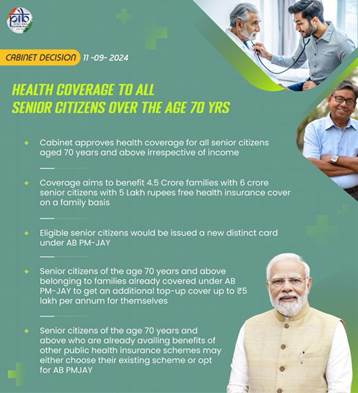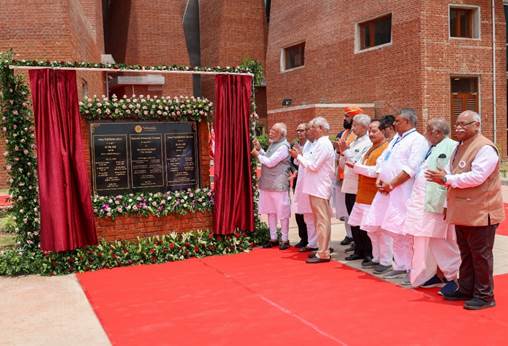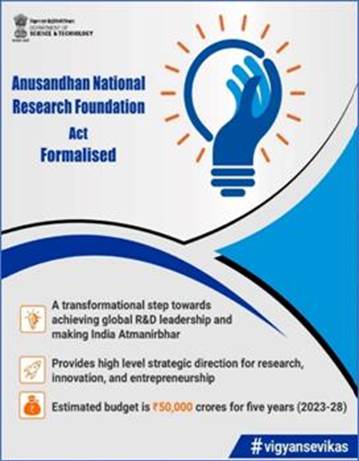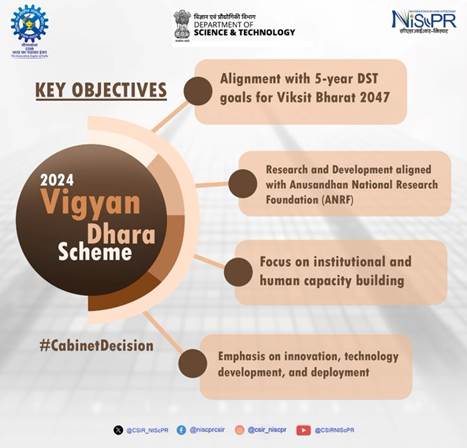India’s Healthcare and Education Sectors Strengthened in Modi’s 100-Day Agenda
In the initial 100 days of Prime Minister Narendra Modi’s third term, the Indian government has unveiled a series of groundbreaking initiatives designed to strengthen the nation’s healthcare and education sectors. These ambitious programs focus on improving healthcare accessibility, medical education, research, and technological advancement. From expanding the benefits of Ayushman Bharat Pradhan Mantri Jan Arogya Yojana (AB PM-JAY) to senior citizens, to launching innovative platforms like the U-WIN Portal for digitized vaccination services, the government has prioritized building a healthier and better-educated society. Additionally, initiatives like the establishment of the National Medical Register Portal, the creation of 75,000 new medical seats, and policy reforms in cancer treatment and biotechnology reflect a long-term vision to create a self-reliant and resilient nation.
Ayushman Bharat Pradhan Mantri Jan Arogya Yojana (AB PM-JAY)

The Union Cabinet approved the health coverage to all the senior citizens aged 70 years and above irrespective of income under the flagship scheme Ayushman Bharat Pradhan Mantri Jan Arogya Yojana (AB PM-JAY) on September 11, 2024. This initiative aims to benefit approximately 4.5 Crore families with six crore senior citizens with 5 Lakh rupees free health insurance cover on a family basis. AB PM-JAY is the world’s largest publicly funded health assurance scheme which provides health cover of Rs. 5 lakh per family per year for secondary and tertiary care hospitalization to 55 crore individuals corresponding to 12.34 crore families. All senior citizens aged 70 years and above, regardless of their socio-economic status, are now eligible for AB PM-JAY benefits and will receive a distinct card under the scheme.
U-WIN Portal

The U-WIN Portal, developed for the complete digitization of vaccination services, maintains vaccination records for pregnant women and children from birth to 17 years under the Universal Immunization Programme. The citizen-centric services of the digital platform include ‘Anytime Access’ and ‘Anywhere’ vaccination services, self-registration by citizens using the U-WIN web-portal or the U-WIN citizen mobile application, automated SMS alerts, universal QR-based eVaccination Certificate and utility to create their Ayushman Bharat Health Account (ABHA) ID for themselves and Child ABHA ID for their children. The portal is available in 11 regional languages, including Hindi. As on September 16, 2024, 6.46 crore beneficiaries have registered, 1.04 crore vaccination sessions held and 23.06 crore administered vaccine doses recorded on the portal. [1]
National Medical Register Portal
The National Medical Register (NMR) Portal of the National Medical Commission (NMC) was introduced for registration of all the MBBS doctors who are eligible for practice in India. The National Medical Register (NMR) is mandated under Section 31 of the NMC Act, 2019 which states that the Ethics & Medical Registration Board (EMRB) of NMC shall maintain a National Register in electronic form containing the name, address, and all recognized qualifications possessed by a licensed medical practitioner. NMR serves as a comprehensive and dynamic database for all allopathic (MBBS) registered doctors in India. The uniqueness of the NMR is that it is linked with the Aadhaar ID of the doctors which ensures the individual’s authenticity. Through this portal, all stakeholders, including State Medical Councils (SMCs) and educational institutions can log in and verify applications from a single platform. The NMR portal offers a variety of features, including the ability to add additional qualifications, track applications, suspend licenses, and issue NMR ID cards and digital doctor certificates.[2]
Three Cancer Drugs Exempt from Customs Duty
Three cancer medicines were exempted from customs duty, benefiting the 27 lakh cancer patients in the country. The three cancer drugs namely Trastuzumab Deruxtecan (Breast Cancer), Osimertinib (Lung Cancer) and Durvalumab (Lung Cancer and Biliary Tract Cancer) are used for different tumor types. The custom duty rates on X-ray tubes and flat panel detectors were also revised. These revised rates are expected to positively impact the X-ray machine industry by enhancing component availability at lower costs. This change is anticipated to boost the domestic medical device sector, contribute to component availability at lower costs and reduced healthcare costs, making advanced medical imaging more accessible and affordable.
The budget expenditure for FY 2024-25 under the National Health Mission (NHM) was also increased by approx. Rs 4000 Cr from Rs 31,550 Cr to Rs 36000 Cr. NHM is Central Sponsored Scheme which primarily caters to the Primary and Secondary Healthcare service delivery in the Nation. The focus of the Government is to invest in the Primary and Secondary Public Healthcare facilities for implementing the preventive and curative aspects of Health to reduce the Out-of-Pocket Expenditure of the public at large.
75,000 New Medical Seats to Enhance Healthcare Infrastructure
Aiming to further strengthen India’s healthcare system, the government announced the creation of 75,000 new medical seats over the next five years. This aims to enhance the country’s medical education capacity and address the growing demand for healthcare professionals. Union Minister of State for Health and Family Welfare, JP Nadda addressed the 4th year anniversary ceremony of the National Medical Commission on September 24, 2024. He congratulated NMC on its fourth anniversary and commended it for adding 25,000 UG and PG seats during the last four years. He also noted that NMC achieved its target of 1,00,000 MBBS seats in the country a year in advance. He further encouraged NMC to achieve the target set by the Prime Minister of India, Narendra Modi, of adding 75,000 medical seats over the next 5 years to meet the growing demand of aspiring medical professionals.[4]
Nalanda University’s New Campus Inaugurated

The Prime Minister Narendra Modi inaugurated the new campus of Nalanda University at Rajgir, Bihar on June 19, 2024. The University is conceived as a collaboration between India and East Asia Summit (EAS) countries. The Nalanda University Campus has two Academic Blocks with 40 Classrooms having a total seating capacity of around 1900. It has two auditoriums having a capacity of 300 seats each, a student hostel with a capacity of around 550 students and various other facilities including an International Centre, an Amphitheater that can accommodate up to 2000 individuals, a Faculty Club and a Sports Complex among others. The Campus is a ‘Net Zero’ Green Campus. It is self-sustainable with solar plant, domestic and drinking water treatment plant, water recycling plant for reusing wastewater, 100 acres of water bodies, and many other environment-friendly facilities.
Anusandhan National Research Fund
The Anusandhan National Research Foundation (ANRF) was established with Anusandhan National Research Foundation (ANRF) Act 2023. The ANRF aims to seed, grow, and promote research and development (R&D) and foster a culture of research and innovation throughout India’s universities, colleges, research institutions, and R&D laboratories. The ANRF provides high-level strategic direction for scientific research, ensuring collaborations between industry, academia, government departments, and research institutions. It creates an interface for the participation and contribution of industries and state governments. The objective of the initiative is to support basic research and prototype development. The Anusandhan National Research Foundation Act, 2023, outlines an estimated cost of Rs. 50,000 crores for the period 2023-2028 to support and promote R&D activities.[6]

Vigyan Dhara Scheme
Vigyan Dhara is a comprehensive scheme introduced to promote scientific research, innovation, and technological development. This unified approach aims to strengthen the country’s Science, Technology, and Innovation (STI) ecosystem and contribute to India’s overall development. The scheme has three broad components- Science and Technology (S&T) Institutional and Human Capacity Building, Research and Development and Innovation, Technology Development and Deployment. The proposed outlay for the implementation of the unified scheme ‘Vigyan Dhara’ is Rs.10,579.84 crore during the 15th finance Commission period from 2021-22 to 2025-26. The merger of the schemes into a single scheme would enhance efficiency in fund utilization and establish synchronization among the sub-schemes/programs. Implementation of the scheme will strengthen the S&T infrastructure of the country by fostering well-equipped R&D labs in the Academic Institutions.[7]

BioE3 Policy
The salient features of BioE3 (Biotechnology for Economy, Environment and Employment) Policy include innovation-driven support to R&D and entrepreneurship across thematic sectors. This initiative accelerates technology development and commercialization by establishing Biomanufacturing & Bio-AI hubs and Biofoundries. Along with prioritizing regenerative bioeconomy models of green growth, this policy facilitates expansion of India’s skilled workforce and provides a surge in job creation. Overall, this policy further strengthens Government’s initiatives such as ‘Net Zero’ carbon economy & ‘Lifestyle for Environment’ and steers India on the path of accelerated ‘Green Growth’ by promoting ‘Circular Bioeconomy’. The BioE3 Policy fosters and advances a future that is more sustainable, innovative, and responsive to global challenges and lays down the Bio vision for Viksit Bharat. High performance biomanufacturing is the ability to produce products from medicine to materials, address farming and food challenges, and promote manufacturing of bio-based products through integration of advanced biotechnological processes.[8]
Conclusion
The Indian government’s recent initiatives, launched in the early days of PM Modi’s third term, underscore a commitment to building a robust healthcare and education system that meets the needs of an evolving society. By providing expanded health coverage for senior citizens, creating a more digitized and accessible healthcare infrastructure, and advancing the medical education sector, the government is paving the way for a healthier, more resilient India. Meanwhile, significant strides in research and technology, like the BioE3 Policy, promise to foster innovation and sustainable growth in critical sectors. Together, these reforms signal a new era of development aimed at building a prosperous and forward-looking India.

